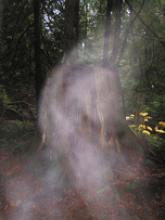1. Location, Location, Location!
Scouting out potential locations is often the hardest part of ghost hunting. It requires patience, persistence, and keeping an ear open.
It also requires permission! No matter how run-down and abandoned the location seems, someone owns it, and they will likely take a dim view of anyone tramping around there after dark. Always secure permission from the property owners before investigating a site.
No one wants to end a session with a ride in the back of a police cruiser, or a trespassing charge!
Always treat your location with respect. Remember that you're a guest, whether you're investigating your best friend's house or an empty lot. Leave everything just the way you found it. If you open a gate, close it behind you. If you finish a candy bar, put the wrapper in your pocket - don't just drop it on the ground.
And remember: safety first! Many locations (such as abandoned properties) would be dangerous during the day. Working a location after dark makes it even easier to trip, fall, get cut, twist an ankle, or worse. Always investigate in teams of at least two people, just in case.
You can find haunted locations by perusing the library, searching online databases, asking around, and keeping an eye open. Many hauntings are sparked by renovation, so learn to recognize the signs of a home being renovated. (A big dumpster out front is a good clue!)
2. Flashlights And Spare Batteries
You really can't have too many flashlights. At the very least, bring a full-size flashlight and a penlight for each team member.
Battery drain is often reported in the vicinity of ghosts. If you lose all your battery power while you're out in the woods after dark, you will be in sorry shape! Be sure to pack plenty of spare batteries, to keep from being stranded in the dark until dawn.
3. Camera
A simple digital camera will let you take pictures of the location, and give you the chance to catch spirits manifesting that you may not otherwise have noticed.
4. Audio Recorder
MP3 recorders are cheap these days, and mini-cassette recorders are cheaper still. I see tons of both types at the thrift store. You can use your recorder both to try and capture EVPs, and to take audio notes in the dark.
5. Cell Phones And/Or Walkie Talkies
Every team member should have a cell phone or a walkie talkie, so that they can contact the group in case of trouble.
6. Pen and Paper
Be sure that every team member has a pen and a pad of paper ready at their fingertips! You can use it to jot notes, sketch the shape you just saw, communicate silently with your partner, and more.
Photo credit: Flickr/PHILIPPE SOKAZO
